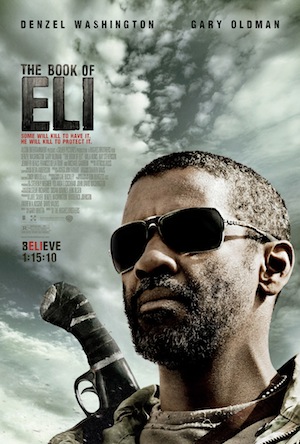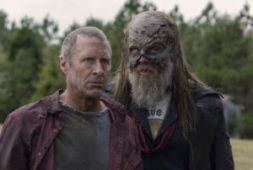
Main Point of Discussion: Let’s not simply know the contents of the Bible; let’s put its contents into practice.
The Movie Clip: “All the years I’ve been carrying [the Bible] and reading it every day…I got so caught up with keeping it safe I forgot to live by what I learned from it.”
The Book of Eli is a great movie with many clips that provoke discussion. It features Denzel Washington as the main character on a mission in post-nuclear America to bring the only remaining copy of the Bible somewhere “west.” The film is quite gritty and violent at times, but at the core of it is a hunger and thirst for God and purpose in life.
The clip we’re using for this particular discussion is from the tail-end of the movie and features a badly wounded Eli walking along the road. He’s distraught because Carnegie, the movie’s villain (played by Gary Oldman), just shot him and stole Eli’s Bible—the last known copy on earth. Solara, Eli’s friend, pulls alongside and helps him, giving Eli a ride. (It should be noted that Eli was motivated to give up “the book” a few scenes before because Carnegie held a gun to Solara’s head.)
Introducing the Clip:
Today I want to show you a clip from the movie The Book of Eli. Some of you have seen this movie already, but for those who haven’t, it features Denzel Washington as the main character on a mission in post-nuclear America to bring the only remaining copy of the Bible somewhere “west.” The clip we’re using is from the tail-end of the movie and features a badly wounded Eli walking along the road. He’s distraught because Carnegie, the movie’s villain, just shot him and stole Eli’s Bible. Solara, Eli’s friend, pulls alongside and helps him, giving Eli a ride. (It should be noted that Eli was motivated to give up “the book” a few scenes before because Carnegie held a gun to Solara’s head.) Let’s take a look at this scene.
Scene Script:
BEGIN CLIP AT 1:30:27 seconds into the movie (chapter 21).
- Solara: I’m sorry.
Eli: For what?
Solara: This. This is all my fault.
Eli: No, it’s not.
Solara: No, it is. If I didn’t come with you none of this would’ve happened.
Eli: It’s not your fault. I did what I had to do.
Solara: I didn’t think anything could make you give up that book. I thought it was too important.
Eli: All the years I’ve been carrying it and reading it every day…I got so caught up with keeping it safe I forgot to live by what I learned from it.
Solara: Yeah, and what’s that?
Eli: Just…do for others more than you do for yourself. That’s what I got from it anyway.
Transitional Statement:
In this scene Eli comes to several realizations: First, saving Solara’s life was more important than holding on to the Bible; second, after years of reading the Bible he lost track of putting its principles into practice; third, that he should have been doing more for others than for himself.
Divide into Small Groups:
Let’s go ahead and split up into our discussion groups, and then afterward we’ll come back together for a final word.
CLICK HERE for a quick training article on how to maximize your small groups using our small group format—a great resource to equip your small group leaders.
Discussion Questions:
- AROUND THE CIRCLE:Before we begin, tell everyone your name and the most valuable (non-human) possession/object you’ve ever lost and never got back.
- ASK A FEW: In the scene we just watched, Solara feels guilty because she’s the reason Eli gave up the Bible to Carnegie; but Eli reassures her that it isn’t her fault, and that he did what he had to do. Have you ever faced a situation where you had to decide between objects/possessions and people? How did you respond?
- ASK A FEW: In the clip, this isn’t just your everyday possession—it’s the last copy of the Bible on earth! Even more, Eli says God wants him to deliver it to a place in the west. Can you imagine an object or possession so rare or precious that you’d never give it up—not at any cost?
- ASK A FEW: In the clip, Eli confesses to Solara that he got sidetracked on his mission to protect and deliver the Bible, forgetting to put its principles into practice. In what kinds of circumstances does this happen to Christians?
- ASK SOMEONE: According to the first verse in the passage (22), what happens to us when we only listen to the Bible? (leader—the answer you’re looking for: We deceive ourselves)
- ASK SOMEONE: According to the same verse (22), what do we need to do in addition to listening to the Bible? (leader—the answer you’re looking for: Do what it says)
- ASK SOMEONE: According to the next two verses (23-24), what kind of person does James compare to those who listen to the Bible but don’t do what it says? (leader—the answer you’re looking for: A man who looks at his face in a mirror and, after looking at himself, goes away and immediately forgets what he looks like)
- ASK A FEW: Can you think of real-life examples of people who have such severe brain issues that they forget what they look like immediately after seeing themselves in the mirror? What’s happened to them to cause such severe forgetfulness? (leader—the answer you might be looking for: Someone who’s suffered a head injury and has no short-term memory left. Or someone suffering from dementia or Alzheimer’s Disease)
- ASK A FEW: Why do you suppose James uses such extreme imagery in this analogy? (leader—the answer you might be looking for: He wanted to drive home the point that believers in Jesus who don’t do what the Bible says are as debilitated—in a spiritual sense—as one with massive brain problems)
- AROUND THE CIRCLE: What kinds of things did Eli do (or may have done) that contributed to him forgetting to do what the Bible commands?
- ASK A FEW: Eli confesses that the cause of his spiritual amnesia was keeping the Bible “safe.” Can you think of real-life examples of Christians who’re on the same kind of “mission”? What kinds of things do these Christians do to protect the Bible—and/or the church? The faith?
- ASK A FEW: Is it necessary to “defend” the faith? Or stand up for God in the face of Atheists? Or prove that the Bible is correct to those who say it’s a fairy tale? Why or why not?
- ASK SOMEONE: In the last verse of the passage (25), what does James say happens to people who listen to the Bible and do what it says to do? (leader—the answer you’re looking for: They’ll be blessed in all they do)
- ASK A FEW: From the last line of dialogue in this clip, do you believe Eli is on the path of doing more for others than he does for himself? If so, does that make him a doer of the word, not merely a hearer of it? (James 1:22) Do you think Eli is a Christian? If so, do you think he was a Christian before his mission began? When he was commissioned by God? Or do you think he became a Christian sometime during the movie?
- AROUND THE CIRCLE: What about you? Can you think of ways you hear the Bible, read the Bible—and even memorize the Bible—but don’t do what it says?
Read the following passage:
James 1:22-25 (NIV)
22Do not merely listen to the word, and so deceive yourselves. Do what it says. 23Anyone who listens to the word but does not do what it says is like a man who looks at his face in a mirror 24and, after looking at himself, goes away and immediately forgets what he looks like. 25But the man who looks intently into the perfect law that gives freedom, and continues to do this, not forgetting what he has heard, but doing it—he will be blessed in what he does.
Wrap Up:
Tonight we’ve been looking at the biblical command to be doers of the word, not just hearers of it (or readers of it or memorizers of it). This command may be the hardest of them all, as it pretty much covers every aspect of our day-to-day faith. Hearing the Scriptures and studying the Scriptures and memorizing the Scriptures—even preaching the Scriptures—takes effort and energy and will, no doubt. But how much do those efforts really mean if we don’t do what the Bible tells us to do?
We can learn all day long about caring for the poor and memorizing verses that say to freely give to those in need—and even preach the same message to others…but what does it say about our faith if we, knowing all these commands, consistently walk past homeless people begging for food in the street or hold back money from the collection plate that could be shared with orphans and widows? It’s not easy to do what the Bible says, yet carrying out that principle is the essence of our faith. So…where are you? How much of your hearing of the word leads to doing what it says?
If you’re falling short in this area, take heart. First, confess your sin to God and ask for his forgiveness—you’ll get it! Then ask God for opportunities to do what you know the Bible says to do—and for the strength, courage, and conviction to do it consistently. This is something you should be praying about all the time, because we’re always one selfish decision away from going down the path of complete indifference toward God’s commands. The worst thing you can do now is feel sorry for yourself: You know, the whole “I’ve fallen so far in doing what the Bible says—it’s no use trying anymore.” Don’t believe it! God will rejoice over your reenergized convictions and give you tons of chances to do what his word says to do, as well as the strength to do it—but you must take the first step.
Let’s bow our heads so we can think about ourselves and not those around us. As you sit there with your eyes closed and head bowed, I want you to think about the areas where you have the hardest time living out what the Bible commands. Then I want you to thank God for pointing them out to you, as well as for all the chances God will give you to carry out his message. And remember that I or one of the other adult leaders can help you identify Scriptures that can strengthen you—and we’ll always be praying for you.
Close in Prayer
Written by Dave Urbanski
Jonathan McKee
Jonathan McKee is the author of over twenty books including the brand new The Guy's Guide to FOUR BATTLES Every Young Man Must Face; The Teen’s Guide to Social Media & Mobile Devices; If I Had a Parenting Do Over; and the Amazon Best Seller - The Guy's Guide to God, Girls and the Phone in Your Pocket. He speaks to parents and leaders worldwide, all while providing free resources for youth workers on TheSource4YM.com. Jonathan, his wife Lori, and their three kids live in California.




Kim
March 15, 2015 at 12:00 amThank you! In having a hard time with selfishness, envy and hate. I wish I could get rid of these traits- I know I have a good heart and good intentions but sometimes those traits come out. I really needed this read.